Tiếng Anh 11 Smart World Unit 2 Lesson 1
Tiếng Anh lớp 11 Unit 2 Lesson 1 trang 14
Giải bài tập SGK tiếng Anh 11 Smart World Unit 2 Generation Gap Lesson 1 hướng dẫn giải chi tiết các phần bài tập trong Sách giáo khoa tiếng Anh lớp 11 i Learn Smart World giúp các em học sinh chuẩn bị bài tập tại nhà hiệu quả.
Let's Talk!
In pairs: Look at the picture. Why does the mom look upset with her daughter? What kinds of things do you and your parents sometimes disagree about?
(Theo cặp: Nhìn vào bức tranh. Tại sao người mẹ có vẻ khó chịu với con gái mình? Đôi khi bạn và bố mẹ bạn không đồng ý với nhau về những điều gì?)
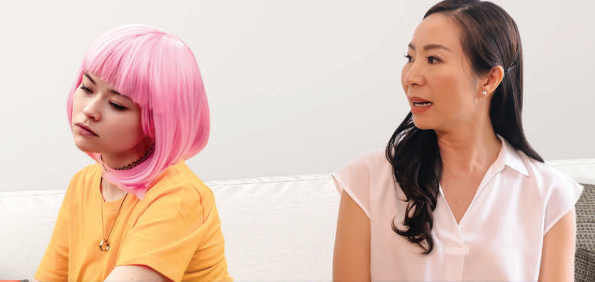
Gợi ý đáp án
The mother seems annoyed with her daughter because of her hair color and behavior.
Sometimes, my parents and I disagree on our dress style, opinions, habits, and behavior.
New Words
a. Add more words to the list, then complete sentences 1-6 with the bold words. Listen and repeat.
(Thêm các từ khác vào danh sách, sau đó hoàn thành câu 1-6 với các từ in đậm. Lắng nghe và lặp lại.)
Bài nghe
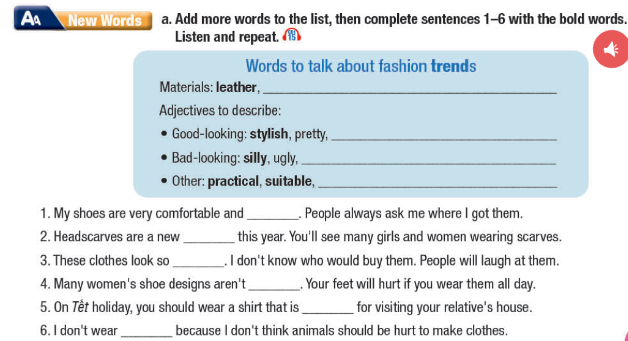
Gợi ý đáp án
Words to talk about fashion trends
Materials: leather, cotton, jeans, wool
Adjectives to describe:
Good-looking: stylish, pretty, fashionable, beautiful, attractive
Bad-looking: silly, ugly, terrible
Other: practical, suitable, comfortable, uncomfortable
|
1. stylish |
2. trend |
3. silly |
|
4. practical |
5. suitable |
6. leather |
Lời giải chi tiết
1. My shoes are very comfortable and stylish. People always ask me where I got them.
(Giày của tôi rất thoải mái và phong cách. Mọi người luôn hỏi tôi lấy chúng ở đâu.)
2. Headscarves are a new trend this year. You'll see many girls and women wearing scarves.
(Khăn trùm đầu là một xu hướng mới trong năm nay. Bạn sẽ thấy nhiều cô gái và phụ nữ đeo khăn quàng cổ.)
3. These clothes look so silly. I don't know who would buy them. People will laugh at them.
(Những bộ quần áo này trông thật ngớ ngẩn. Tôi không biết ai sẽ mua chúng. Mọi người sẽ cười nhạo họ.)
4. Many women's shoe designs aren't practical. Your feet will hurt if you wear them all day.
(Nhiều thiết kế giày của phụ nữ không thực tế. Bàn chân của bạn sẽ bị đau nếu bạn mang chúng cả ngày.)
5. On Tết holiday, you should wear a shirt that is suitable for visiting your relative's house.
(Vào ngày Tết, bạn nên mặc một chiếc áo phù hợp để đến thăm nhà họ hàng của bạn.)
6. I don't wear leather because I don't think animals should be hurt to make clothes.
(Tôi không mặc đồ da vì tôi không nghĩ rằng động vật nên bị tổn thương để làm quần áo.)
b. In pairs: Use the words in Task a to describe the pictures. Which styles do you like? Why?
(Theo cặp: Sử dụng các từ trong Bài a để mô tả các bức tranh. Bạn thích phong cách nào? Tại sao?)

Gợi ý đáp án
- I think the man wearing a floral shirt inside and a vest outside looks silly.
- I think the man with long hair looks very comfortable.
- I think the girl in the leather jacket looks very trendy.
- I like the style of the girl in the leather jacket because that style looks both stylish and trendy.
Listening
a. Listen to a podcast about fashion in the past. What is the main focus of the talk?
(Nghe một podcast về thời trang trong quá khứ. Trọng tâm chính của bài nói chuyện là gì?)
Bài nghe

Gợi ý đáp án
1. popukar fashion trends
Nội dung bài nghe
Chris: Rachel, look at this!
Rachel: Chris! What are you wearing? Are you going to a 70s party?
Chris: Haha, no, I'm not. It's because today we're talking about fashion trends in the past.
Rachel and Chris: Welcome to Fashion Dive Podcast.
Rachel: This is Rachel.
Chris: And I'm Chris.
Rachel: You know, younger generations often make fun of older generations' fashion.
Chris: Yes. But fashion trends often come back. A lot of what they wear is actually old trends.
Rachel: Right. Like the miniskirt.
Chris: Yes. It was invented in the 1960s. A British fashion designer experimented with shorter skirts, and it became a huge trend. It was one of the greatest inventions in the fashion world, wasn't it?
Rachel: Yep!
Chris: Now, take a look at these photos. They're so stylish, aren't they?
Rachel: Erm... yes.
Chris: A big trend in the 1970s was bell-bottoms. And I'm wearing those, in case you haven't noticed. They had large leg openings from the knees down. The openings could be as wide as sixty-six centimeters.
Rachel: In the 1980s, women entered the workforce in large number and they wanted to look powerful. This was known as "power dressing," and shoulder pads were a big part of it.
Chris: Many trends in the 80s were silly but not this one. Power dressing sounds really cool, doesn't it?
Rachel: Yes, it does.
Chris: Fashion in the 1990s …
b. Now, listen and fill in the blanks.
(Bây giờ, hãy lắng nghe và điền vào chỗ trống.)
Bài nghe
1. The miniskirt was invented in the ____________.
2. The speakers both think that the ______________ was one of the greatest inventions in the fashion world.
3. Bell-bottoms could have legs opening up to _____________ centimeters.
4. A trend in the ______________ was "power dressing." Women wore shoulder pads to look powerful.
5. Rachel agrees that, ________________ sounds really cool.
Gợi ý đáp án
|
1. 1960s |
2. miniskirt |
3. 66 |
4. 1980s |
5. power dressing |
c. Read the Conversation Skill box. Then, listen and repeat.
(Đọc hộp Kỹ năng đàm thoại. Sau đó, nghe và lặp lại.)
Bài nghe
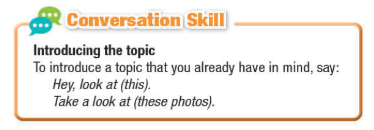
d. Now, listen to the podcast again and circle the phrase you hear.
(Bây giờ, hãy nghe lại podcast và khoanh tròn cụm từ bạn nghe được.)
Bài nghe
Gợi ý đáp án
Take a look at (these photos).
e. In pairs: What do you think of the trends discussed in the podcast?
(Theo cặp: Bạn nghĩ gì về các xu hướng được thảo luận trong podcast?)
Gợi ý đáp án
The trends discussed in the podcast are really interesting. These trends show the diversity, richness in styles and fashion perspectives at different periods.
Grammar Meaning & Use
a. Look at the picture. What do you think the girls are saying?
(Nhìn vào bức tranh. Bạn nghĩ các cô gái đang nói gì?)
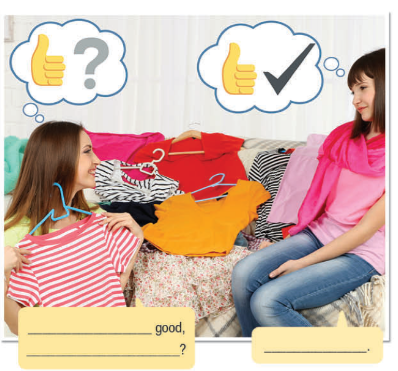
Gợi ý đáp án
This looks good, doesn’t it?
Yes, it does.
b. Now, listen and check your ideas.
(Bây giờ, hãy lắng nghe và kiểm tra ý tưởng của bạn.)
Bài nghe
c. Listen and repeat.
(Lắng nghe và lặp lại.)
Bài nghe
Grammar Form & Practice
a. Fill in the blanks with the correct tag questions and responses.
(Điền vào chỗ trống với các câu hỏi và câu trả lời chính xác.)
1. A: The 1970s had the best music, didn't it?
B: No, it didn't. 80s music was much better.
2. A: Men's fashion in the 1970s wasn't very good, ______________?
B: _________________ , it wasn't. It was very boring.
3. A: Teens like to follow the latest trends, ________________?
B: Yes, __________________.They always want the latest fashions.
4. A: We didn't have the best hairstyles back then, _________________?
B: No, ______________. Hairstyles looked silly in those days.
5. A: He likes wearing practical clothes, ______________?
B: Yes, __________________.
6. A: Alice is really interested in fashion, __________________?
B: Yes, ___________________. She always buys new clothes.
Gợi ý đáp án
|
1. didn’t it - it didn’t |
2. was it - No |
3. don’t they - they do |
|
4. did we - we didn’t |
5. doesn’t he - he does |
6. isn’t she - she is |
b. Complete the questions using the prompts, then answer the questions.
(Hoàn thành các câu hỏi bằng cách sử dụng các gợi ý, sau đó trả lời các câu hỏi.)
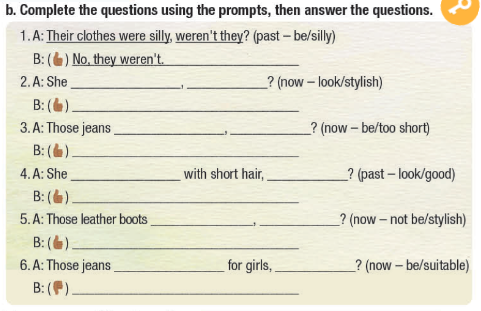
Gợi ý đáp án
1. A: Their clothes were silly, weren’t they?
B: No, they weren’t.
2. A: She looks stylish, doesn’t she?
B: Yes, she does.
3. A: Those jeans are too short, aren’t they?
B: Yes, they are.
4. A: She looked good with short hair, didn’t she?
B: Yes, she did.
5. A: Those leather boots aren’t stylish, are they?
B: No, they aren’t.
6. A: Those jeans are suitable for girl, aren’t they?
B: No, they aren’t.
c. In pairs: Make comments on the pictures on page 14 and see if your friend can guess which picture you're commenting on.
(Làm theo cặp: Đưa ra các nhận xét về bức tranh ở trang 14 và xem bạn của bạn có đoán được bạn đang nhận xét bức tranh nào không.)
Gợi ý đáp án
A: The woman's outfit is very stylish, isn't it?
B: Yes, it is. It has the style of the 1980s.
A: The men's outfits look very trendy, isn’t it?
B: No, it isn’t. His outfit looks so colorful.
Pronunciation
a. Intonation falls at the end of question tags used to confirm agreement.
(Ngữ điệu rơi ở cuối câu hỏi đuôi dùng để khẳng định sự đồng ý.)
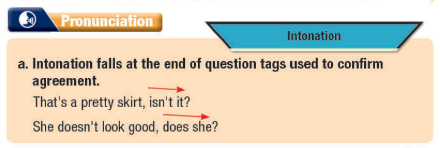
b. Listen to the sentences and notice how the intonation falls.
(Nghe các câu và để ý ngữ điệu rơi như thế nào.)
Bài nghe
Mom looked very stylish, didn't she?
It isn't very expensive, is it?
c. Listen and cross out the sentence with the wrong intonation.
(Nghe và gạch bỏ câu có ngữ điệu sai.)
Bài nghe
That trend wasn't very practical, was it?
This dress is a bit short, isn't it?
Gợi ý đáp án
This dress is a bit short, isn't it?
=> Wrong. Intonation rises.
d. Read the sentences with the correct intonation to a partner.
(Đọc các câu với ngữ điệu chính xác cho bạn.)
Practice
a. Practice the conversation. Swap roles and repeat.
(Thực hành các cuộc đối thoại. Trao đổi vai trò và lặp lại.)
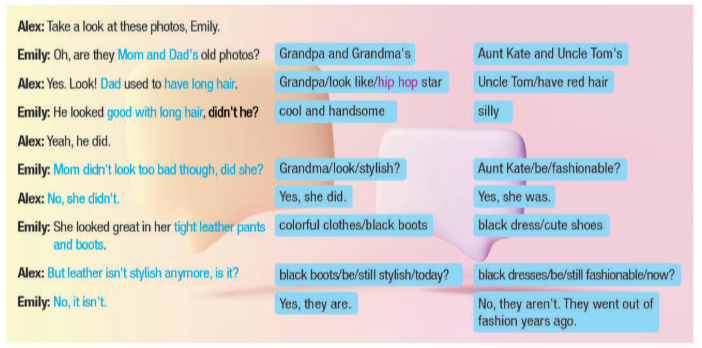
b. Make two more conversations using the ideas on the right.
(Thực hiện thêm hai cuộc hội thoại bằng cách sử dụng các ý tưởng bên phải.)
Gợi ý đáp án
1. Alex: Take a look at these photos, Emily.
Emily: Oh, are they Grandpa and Grandma’s old photos?
Alex: Yes. Look! Grandpa used to look like a hip hop star.
Emily: He looked cool and handsome, didn't he?
Alex: Yeah, he did.
Emily: Grandma looked stylish, didn’t she?
Alex: Yes, she did.
Emily: She looked great in her colorful clothes and black boots.
Alex: But black boots aren’t still stylish today, they aren’t?
Emily: Yes, they are.
2. Alex: Take a look at these photos, Emily.
Emily: Oh, are they Aunt Kate and Uncle Tom’s old photos?
Alex: Yes. Look! Uncle Tom used to have red hair.
Emily: He looked silly, didn't he?
Alex: Yeah, he did.
Emily: Aunt Kate was fashionable, wasn’t she?
Alex: Yes, she was.
Emily: She looked great in her black dress and cute shoes.
Alex: But black dresses aren’t still fashionable now, they aren’t?
Emily: Yes, they aren’t. They went out of fashion years ago.
Speaking
DESCRIBING OLD PHOTOS: SHE LOOKS SO SILLY, DOESN'T SHE?
(Mô tả những bức ảnh cũ: Trông cô ấy thật ngớ ngẩn phải không?)
a. In pairs: Make comments you think your partner will agree with about the clothes and hairstyles. Compare the trends in the past with ones that are popular now. Then, choose what you like most and least.
(Làm theo cặp: Đưa ra nhận xét mà bạn nghĩ bạn của mình sẽ đồng ý về quần áo và kiểu tóc. So sánh các xu hướng trong quá khứ với những xu hướng phổ biến hiện nay. Sau đó, chọn những gì bạn thích nhất và ít nhất.)

Gợi ý đáp án
A: That jacket looked stylish, didn’t it?
B: Yes, it did. We have better clothes now, don’t we?
A: In my opinion, older fashions changed more slowly and gradually from one to another. Fashions of today change drastically in a very short period of time. Often certain clothes will only be in style for one year or so before another, a very different style is in. Of course, there are more choices to choose from now.
B: I mostly like older styles, such as those in 1999. I prefer casuals because I feel comfy and flexible. I also wear a pair of jeans on a regular basis as I can easily mix and match them with a T-shirt and sneakers.
A: I don't like frizzy hair because it looks untidy and is difficult to maintain.
b. Join another pair and share your ideas. Which hairstyles and clothes do you like the most? Why?
(Tham gia một cặp khác và chia sẻ ý tưởng của bạn. Bạn thích kiểu tóc và quần áo nào nhất? Tại sao?)
Gợi ý đáp án
- I prefer casual clothes actually. I hate getting dressed up for special occasions. Personally I think it’s possible to look good in a pair of jeans and a T-shirt. It gives me comfort.
- I don’t actually have a favorite hairstyle these days. But approximately 3 years ago, I used to be a big fan of the undercut style which was compatible with my round face.
Trên đây là Lesson 1 unit 2 tiếng Anh lớp 11 i-Learn Smart World trang 14 đầy đủ nhất.









